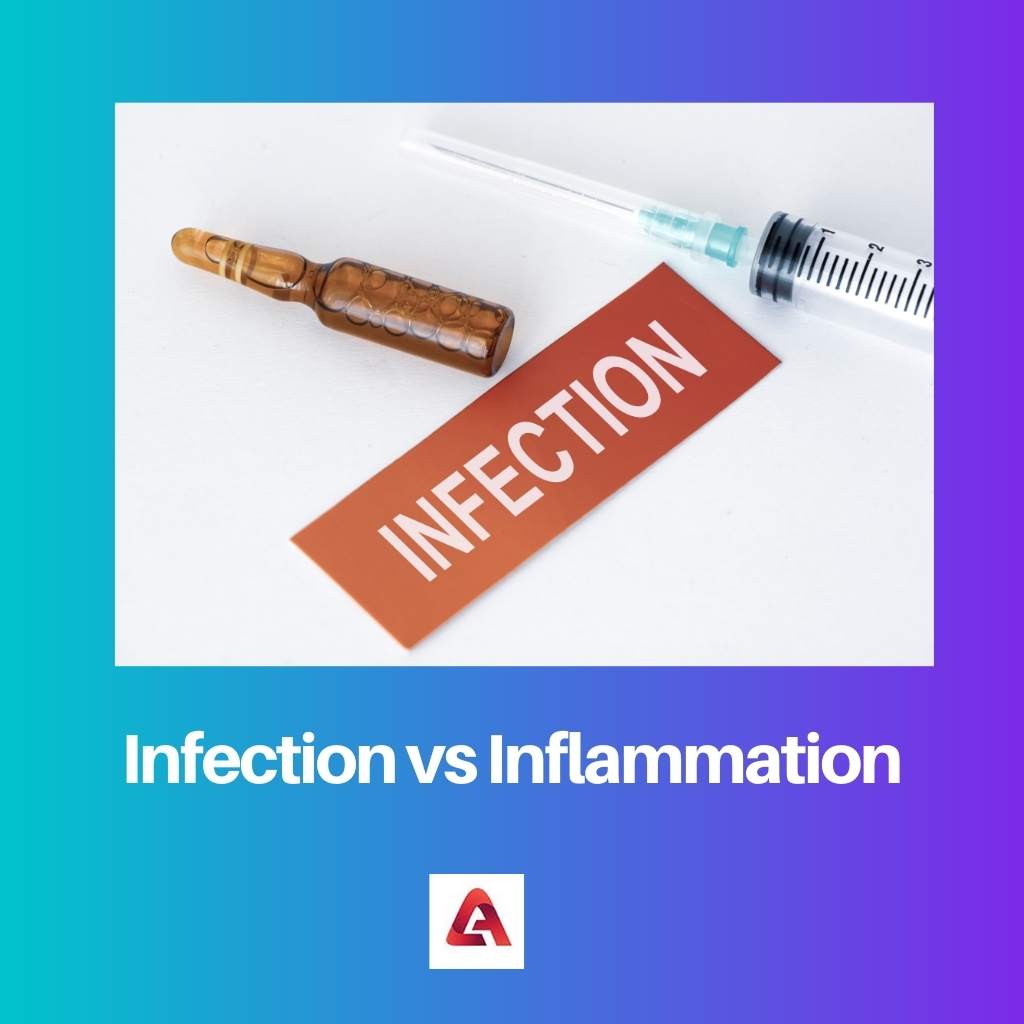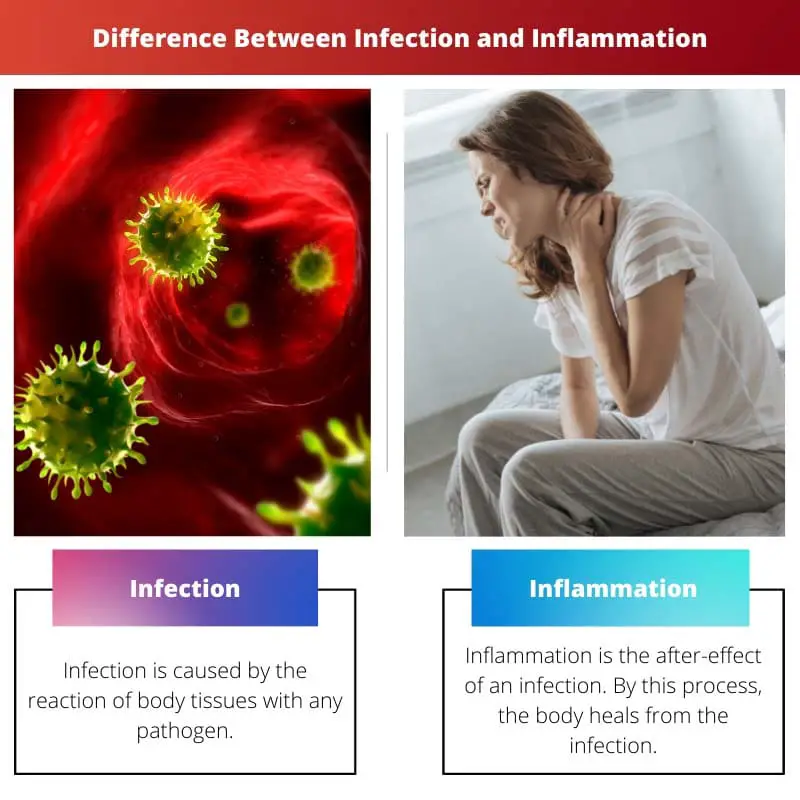Many years ago, people used to treat infection with the help of natural remedies, which branch of medicine is now known as Ayurveda. Our body has its healing system, which requires time but does not require a huge amount of medicines.
So here is the difference between the harm and its recovery process: infection and inflammation.
Key Takeaways
- Infection refers to the invasion and multiplication of harmful microorganisms in the body, while inflammation is the body’s response to injury, infection, or irritation.
- Infection can cause inflammation, but inflammation can also occur without infection.
- Infection can be caused by bacteria, viruses, fungi, and other pathogens, while various factors, such as trauma, chemicals, and autoimmune disorders, can cause inflammation.
Infection vs Inflammation
The difference between infection and inflammation is that the infection is caused due to coming in contact with some pathogen that reacts with the tissues of the host, multiplies itself, and causes complications. On the other hand, inflammation is the body’s healing process after an infection. Infection can cause inflammation, but inflammation never causes an infection.

The reaction of body tissues with any pathogen causes infection. The tissues get damaged from that reaction, and similarly, the pathogen spreads itself and multiplies on other tissues causing the complication in the host’s body.
There are many types of infections, such as fungal, bacterial, or parasitic.
Inflammation is the after-effect of an infection. Through this process, the body heals from the infection. Sometimes the body’s immune system becomes more active and starts to harm its tissues. This type of disorder is called an autoimmune disorder. It also leads to inflammation.
Comparison Table
| Parameters of Comparison | Infection | Inflammation |
|---|---|---|
| Definition | Invasion of tissues of an organism, multiplying and reacting with host tissues by any pathogen | Process of body’s self mechanism and is a healing process from infections. |
| Causing agents | Come in contact with certain bacteria, fungi, or parasite | Injury, infection, autoimmune disorder, etc |
| Symptoms | Rashes, the problem of breathing, fever, etc. | Loss of function, swelling, heat, pain, etc. |
| Treatments | Medicines such as antibiotic, antifungal, antiparasitic, etc | Physical therapy, correct and control medication, change in diet and lifestyle |
| Transmission | Possible | Not possible |
What is Infection?
Infection is caused by the reaction of body tissues with any pathogen. The pathogen enters the body through contact or other modes and sets at a tissue.
The tissues get damaged from that reaction, and similarly, the pathogen spreads itself and multiplies on other tissues causing the complication in the host’s body.
The infections are mainly caused by pathogens. These may be viruses, parasites, bacteria, or fungi. The fungal infection is caused by fungi, bacteria by bacteria, viral infections through viruses, etc. These have medications to treat and stop the infection from spreading in the body.
Preventing these infections is possible by preparing your body to fight these problems. This means to make your immunity system stronger to fight the incoming pathogens in the body. One should consume a balanced diet consisting of fruits, vegetables, etc.
The treatment of these infections needs to be done at the proper time to stop the reactions and stop them from spreading to other parts of the body and making the situation worse. Mild infections can be treated at home.
But one should consult the doctor if the conditions worsen. Infections are transmittable to other people through cough droplets or by cough. So one should be very careful about it and take necessary precautions.

What is Inflammation?
Inflammation is the after-effect of an infection. Through this process, the body heals from the infection. Sometimes the body’s immune system becomes more active and starts to harm its tissues. This type of disorder is called an autoimmune disorder.
It also leads to inflammation. The most caused disease related to inflammation caused by autoimmune disorders is rheumatoid arthritis. Inflammation is one of the major symptoms of this disease.
Inflammation also occurs due to some injuries. When someone gets a crack in their bone or goes through a cartilage injury, that portion of the body gets inflamed. Inflammation leads to pain in that area.
At this time, many biochemical reactions occur in that area that may lead to trigger the pain. That pain may be throbbing or steady.
Symptoms of inflammation include swelling in that area, redness, and throbbing pain, loss of function or sensation. Sometimes due to heavy pain in the injured area, the sensation of that area is lost. As for the pain, the function is also being affected.
For example, if we get out, our feet bones crack, and we can’t walk. The inflammation can never spread with contact or any other means to other people. Inflammation may be an after-effect of infection, but inflammation never leads to an infection.

Main Differences Between Infection and Inflammation
- Infection occurs due to the invasion of tissues of an organism, multiplying and reacting with host tissues by any pathogen. In contrast, inflammation is a process of the body’s self-mechanism and is a healing process from infections.
- Some symptoms of infection are rashes, the problem of breathing, fever, etc., whereas inflammation leads to symptoms like loss of function, swelling, heat, pain, etc. Inflammation itself is a symptom of infection.
- The main causes of infection are when a person comes in contact with certain bacteria, fungi, or parasites. On the other hand, injury, infection, autoimmune disorder, etc., leads to inflammation.
- Medicines such as antibiotics, antifungal, antiparasitic, etc., are the treatments for infection. On the other hand, physical therapy, correcting and controlling medication changes in diet and lifestyle can help in soothing inflammations.
- Transmission of infection from one person to the other is possible, but inflammation is not possible to be transmitted.

- https://www.sciencedirect.com/science/article/pii/S1473309902004371
- https://pdfs.semanticscholar.org/4377/fb5b0375b2c1ec2f53e70f07e69d9eaba208.pdf

This article offers an insightful exploration of infection and inflammation. The comparison table is especially helpful in understanding the differences.
I completely agree, Alexander Harrison. The article’s structure makes it easy to grasp these complex concepts.
I appreciate the thorough comparison between infection and inflammation. This level of detail is exactly what I was looking for.
Couldn’t agree more, Keeley25. The depth of information here is truly impressive.
Absolutely, Keeley25. This kind of comprehensive analysis is essential for understanding these concepts.
The detailed discussion of infection and inflammation provides valuable knowledge for anyone interested in healthcare and wellness.
Absolutely, Rosie59. It’s important to have access to well-researched information on these topics.
This level of thorough exploration is exactly what’s needed to promote awareness and understanding of health issues.
This is a bit too technical for me. I prefer articles that are less detailed and easier to understand.
I understand where you’re coming from, Omoore. Sometimes a simplified version can be more accessible for a wider audience.
The comprehensive overview of infection and inflammation in this article is incredibly valuable. It’s a fantastic resource for education and health promotion.
Absolutely, Ematthews. More people should have access to this kind of in-depth knowledge about health and well-being.
I appreciate the depth of information provided, but I wish the tone was a bit more lighthearted. Health topics can sometimes benefit from a touch of humor.
I see what you mean, Lola83. Injecting some humor could make this content more engaging for a wider audience.
Humor definitely has its place in health education. It could add a new dimension to an already comprehensive article.
It’s so refreshing to read about the difference between infection and inflammation. This post is incredibly informative and well-written.
Absolutely agree, Ray31. It’s so important for people to understand these concepts.
I’m learning a lot from this article. Understanding the difference between the two can make a significant impact on public health.
I found this article to be quite enlightening. However, I wish it included some practical tips for managing infection or inflammation.
I understand your point, Lhall. It would be helpful to have actionable steps for maintaining health in relation to these conditions.
Thank you for this informative discussion of infection and inflammation. It’s a topic that’s incredibly relevant to everyone’s health.
This article provides valuable insights into the distinction between infection and inflammation. It’s an excellent resource for anyone interested in the topic.
Couldn’t agree more, Wright Louis. The clarity and depth of information here really stand out.